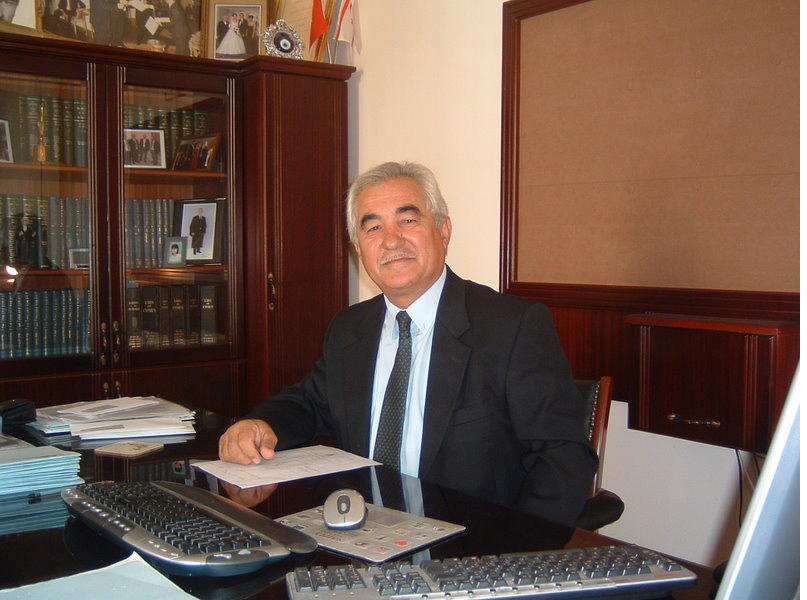Advocate: Arif Tahir Erişen
Former Chairman of the Mehmetcik Philanthropic Association in the U.K. 1973 -1975 and 1982 – 2003 (23Years) Former Public Relations and General Secretary of the Council of Turkish Cypriots Association in the U.K – 1984 – 1992 Former Spokesman of the North Cyprus Turkish Rights Committee in the U.K – 1999 – 2003
PREFACE
From the documents, the United Nation Resolutions and The International Agreements and together with other proofs of evidence referred to in this book, you will see the suffering inflicted on the Turkish Cypriots by the Greeks during the period from 1963 until 1974. In this article you will see how and why the Greek Cypriots wrecked the Cyprus Republic and will read openly the inhumane embargoes imposed on the Turkish Cypriots by the Greek Cypriots. You will also read how the European Union has not honored their decision taken on the 26th April 2004 by the Commission of the European Union to lift the isolation on the Turkish Cypriots.
Furthermore, this article will give you the historical facts and the legal aspects of Cyprus and it will enlighten andpresent you with information on the aspect of human rights by analysing of the decisions given by the European Court of Human Rights in relation to Cyprus, especially on the matter of property disputes and problems. Despite all the sufferings, the Turkish Cypriots have always been on the side of accepting the United Nation Peace Plan and finally accepted the U.N General Secretary Kofi Annan’s Peace Plan in the Referendum held on the 24th of April 2004. Yet again this ultimate peace plans were refused by the Greek Cypriots.
Nevertheless, the Turkish Cypriots are living in the hope that one day a fair and lasting settlement will be reached by
the two communities which will bring peace and prosperity to the island, friendship to the motherlands of Turkey and Greece and stability to the Eastern Mediterranean for the good of the neighboring countries and to the world at large. However if the Greek Cypriots do not want to come to a settlement, the Turkish Cypriots will not wait for them forever, and each community will follow their destiny on their own path.
4th Revised Print
THE COMMUNAL AND POLITICAL RIGHTS OF THE TURKISH CYPRIOTS UNDER THE CONSTITUTION OF THE REPUBLIC OF CYPRUS
HOW THE GREEK CYPRIOTS WRECKED THE CYPRUS REPUBLIC IN 1963 AND FOR THE LAST 50 YEARS ALWAYS REJECTED THE PEACE PLANS.
AFTER THE DECISION IN THE DEMOPOULOS CASE WAS GIVEN, THE LEGAL ARGUMENTS OF THE GREEK CYPRIOTS CLAIMING BACK ALL THEIR IMMOVABLE PROPERTIES LEFT IN THE TRNC AND THEIR STRATEGY IN RELATION TO PROPERTY MATTERS IN THE NEGOTIATIONS COLLAPSED.
WILL THE TURKISH AND GREEK CYPRIOTS REACH A SETTLEMENT OR WILL EACH ONE WALK THEIR OWN PATH TO THEIR OWN DESTINY ?
Dear Readers,
Before describing the present situation and trying to find out as to what might happen in the future, to this strategically very important island of Cyprus, I think it would be useful, if we first take a short look into the past history of the island. We will see that after the Ottoman Empire ruled Cyprus form 1571 for over 300 years, they were forced to lease Cyprus to Great Britain in 1878 in return for the military help given to the Ottomans by the British in their wars with the Russians.
Here below is some information extracted from The Cyprus Convention in 4th June 1878, between the Ottoman Empire and Great Britain.
The Cyprus Convention of 4th June 1878 was a secret agreement reached between the United Kingdom and the Ottoman Empire which granted control of Cyprus to Great Britain in exchange for their support of the Ottomans during the Congress of Berlin.
This agreement was the result of secret negotiations that took place earlier in 1878.

Ottoman’s wars with the Russians from 1853 until 1918. The Ottomans rented Cyprus to Great Britain in 1878 in exchange for the help the British gave the Ottomans militarily in their wars with the Russians’.
ARTICLE I:
If Batoum, Ardahan, Kars, or any of them shall be retained by Russia, and if any attempt shall be made at any future time by Russia to take possession of any further territories of His Imperial Majesty the Sultan in Asia, as fixed by the Definitive Treaty of Peace, England engages to join His Imperial Majesty the Sultan in defending them by force of arms.
And in order to enable England to make necessary provision for executing her engagement, His Imperial Majesty the Sultan further consents to assign the Island of Cyprus to be occupied and administered by England.
ARTICLE III:
That England will pay to the Porte whatever is the present excess of revenue over expenditure in the island; (this excess to be calculated upon and determined by the average of the last five years, stated to be 22,336 purses, to be duly verified hereafter, and to the exclusion of the produce of State and Crown lands let or sold during that period.)
ARTICLE VI:
That if Russia restores to Turkey Kars, and the other conquests made by her in Armenia during the last war, the Island of Cyprus will be evacuated by England, and the Convention of the 4th of June, 1878, will be at an end.
Done at Constantinople, the 1st day of July 1878 http://en.wikipedia.org/wiki/Cyprus_Convention 25/08/2011
After the 1878 Cyprus Convention, and following the wars between the Ottoman, Armenians and the Russians, the Towns of Kars, Ardahan and the surrounding territories were captured by the Ottoman and then later by the newly formed Turkish Administration and finally with the Treaty of Kars signed on the 23.10.1921, the Towns of Kars, Ardahan, Igdir and the surrounding territories were given to Turkey.
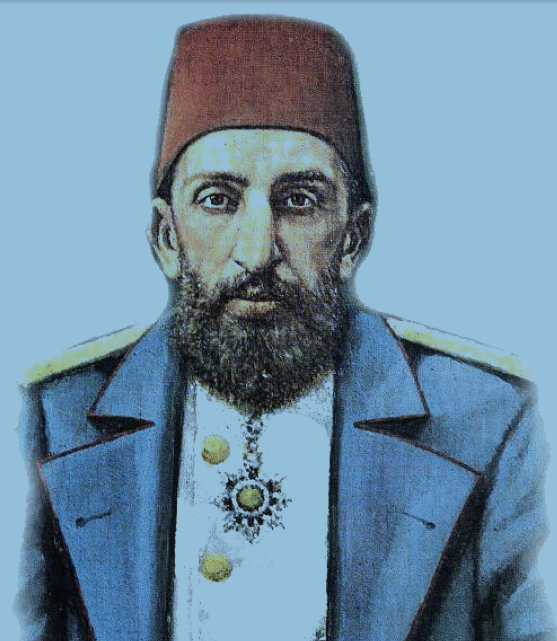
Emperor of Ottomans Sultan II Abdülhamit Han – Rented Cyprus in 1878 to Great Britain.
Ever since, no attempt has been made by the Russians to take possession of Kars and any other further territories from the Turks. However, due to the fact that the Ottoman Empire in the First World War took part on the side of the Germans which was the defeated side, the British on the Allies side occupied Istanbul in 1918 together with the French. At this time, during the Turkish war of independence, the Bolshevik Russian Government in power (Lenin) assisted the Turks by supplying considerable amounts of weaponry and money.
However, Great Britain did not honour her undertaking under the Article VI of the Cyprus Convention to evacuate the Island of Cyprus and to handover to Turkey. On the contrary under the Treaty of Lausanne, section 20 below, the British got the sovereignty and ruled the Island of Cyprus as their Colony until 1960.
Here below is some information extracted from The Peace Treaty of Lausanne signed by Turkey with Great Britain, France, Italy and by the other six Countries,
Peace Treaty of Lausanne 24th July 1923
ARTICLE 20:
Turkey hereby recognizes the annexation of Cyprus proclaimed by the British Government on the 5th November, 1914.
ARTICLE 21:
Turkish nationals ordinarily resident in Cyprus on the 5th November, 1914, will acquire British nationality subject to the conditions laid down in the local law, and will thereupon lose their Turkish nationality. They will, however, have the right to opt for Turkish nationality within two years from the coming into force of the present Treaty, provided that they leave Cyprus within twelve months after having so opted.
Turkish nationals ordinarily resident in Cyprus on the coming into force of the present Treaty who, at that date, have acquired or are in process of acquiring British nationality in consequence of a request made in accordance with the local law, will also thereupon lose their Turkish nationality.
It is understood that the Government of Cyprus will be entitled to refuse British nationality to inhabitants of the island who, being Turkish nationals, had formerly acquired another nationality without the consent of the Turkish Government.
http://wwi.lib.byu.edu/index.php/Treaty_of_Lausanne 25.08.2011
Finally, Great Britain handed over the sovereignty of Cyprus to the Turkish and Greek Cypriot communities in 1960, under the formation of the Cyprus Republic but retained two sovereign bases, Dhekelia at Larnaca and Akrotiri at Limasol.
The Cyprus Republic, which was formed in partnership between the Turkish and Greek Cypriots on the 16th of August 1960, lasted for only 3 years. The first Greek Cypriot president of the Cyprus Republic was Archbishop Makarios III and the first Turkish Cypriot Vice-President of Cyprus Republic was Dr. Fazıl Küçük. The sudden formation of the Republic of Cyprus broke the aims and ambitions of the Greek Cypriots helping to unite Cyprus with the mainland Greece. (Reaching to Enosis)
The 13 points plan, which was put to the Turkish Cypriots by the Greek Cypriots in 1963, aimed to eliminate all the Fundamental Constitutional Rights safeguarding the communal and political equalities of the people of Turkish Cypriots.
As it was rejected by the Turkish Cypriots, on the 21st of December 1963 the Greek Cypriots attacked and aimed to destroy the Turkish Cypriots, (Akritas Plan) and in so doing they wrecked the newly formed Cyprus Republic. The Turkish Cypriots, who were equal partners of the Cyprus Republic were declared as outlaws and forced to live in enclaves in only 3% of the island, under siege by the Greek Cypriots.
From 1963 until 1967 so many Turkish Cypriots were killed and Turkish villages were destroyed. Then, the Turkish Cypriots living in Kofinou (Köfünye -Geçitkale) and Ayios Theodoras (Aytotoro – Boğaziçi) Villages were attacked by the Cyprus National Guard on the 15th of November 1967 under the command of the Greek Cypriot General Georgios Grivas known as Digenis, and by thousands of soldiers of the Greek Army. Again many young and old Turkish Cypriots were killed, and houses burnt down in these villages. As a result of this catastrophic situation, Turkey was forced to give the Greek Cypriots and Greece an ultimatum.
This gave a strong warning that if they did not immediately stop the killings of the Turkish Cypriots, and Greece did not withdraw its army from Cyprus and dismantle the Searching Barricades enforced upon the Turks, Turkey would intervene and take the strongest military measurers necessary in order to save the Turkish Cypriots.
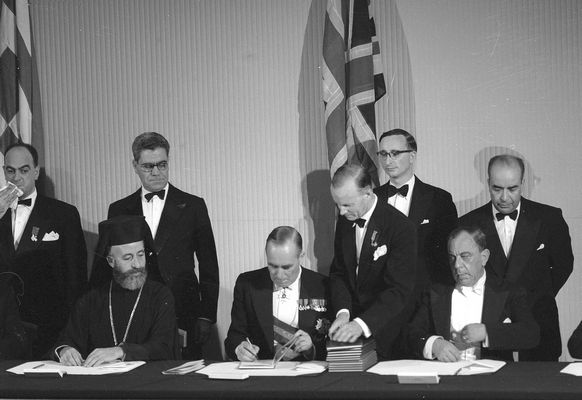
The Treaty of Establishment and Treaty of Guarantee of the Republic of Cyprus signed by the Turkish Cypriot leader Dr. Fazl Kucuk and the Greek Cypriot leader Archbishop Makarios 111 and by the British Governor Sir, Hugh Foot.
As a result of Turkey’s ultimatum, the Greeks stopped their attack on the Turks, General Georgios Grivas and over 10,000 Soldiers of the Greek army were forced to leave the island. They also dismantled the barricades all over Cyprus.
After the normalization of the situation in Cyprus, the intercommunal talks first started in Beyrut in 1968 between the Turkish and the Greek Cypriots.
The Turkish Cypriot’s side was represented by Mr. Rauf Raif Denktas and the Greek Cypriot’s side was represented by Mr. Glofkos Clerides. Since then, these negotiations have been taking place with the hope of finding a fair and lasting settlement between the Turkish and Greek Cypriot in Cyprus, some times in New York at the United Nations and at other venues on and off for the last 45 years.
The aim of the Turkish side in these negotiations has always been to reach a bi-communual and bizonal federal settlement which will be formed by two constituent states and based on the political equality of both communities, securing the Turkish Cypriots with an effective guarantee of Turkey.
This aim should be the red line of the Turkish Cypriots and certainly not fall short below the rights, which were given to the Turkish Cypriots under the Constitution of the Cyprus Republic.
Due to this reason, it is worth looking into and knowing what fundamental rights were in fact given to the Turkish Cypriots under the Constitution of the Cyprus Republic.
Under the Treaty of Establishment and Treaty of Guarantee, in 1960, Cyprus became an Independent state. The Constitutional arrangements stated that, the independent state was to comprise of a Greek Cypriot President and a Turkish Cypriot Vice-President. A Council of Ministers with a ratio of Seven Greeks to three Turks and a House of Representative of fifty members again with a seven to three ratio, were to be separately elected by communal balloting on a universal suffrage bases.
Constitutional disputes were to be examined and decided by the Supreme Constitutional Court, comprised of one Greek Cypriot and one Turkish Cypriot judge and presided over by a contracted judge from a neutral country. (See: Cyprus Republic Constitution, Article. 133,139,149, (a), (b). Also, separately Greek and Turkish Cypriot Communal Chambers were provided to exercise control in matters of religion, culture, and education.
The entire structure of government was strongly bi-communual in composition. In order to prevent the Greek Cypriots from the misuse of their numerical advantage and powers in Presidential, Executive and Legislative matters over the Turks, the decisions of the Council of Ministers had to be taken by an absolute majority and the decisions so taken had to be promulgated (published) immediately by the President and by the Vice-President, by the publication in the official gazette. (See: Cyprus Republic Constitution, Article 46).
The President and the Vice-President had the right of FINAL VETO and the right to return the decision of the Council of Ministers under the same conditions as those laid down for laws and decisions of the House of Representatives. The President and the Vice-President of the Republic, jointly and separately had the right of Final Veto on any law or decision concerning foreign affairs and in so many other areas. (See: C.R.C. Articles 50, 51).
The official languages of the Republic of Cyprus were Greek and Turkish. (See: Article, 3. (1), (2), (3), (4). Legislative and Administrative instruments and documents had to be drawn up and promulgated in the two official languages.
Legal disputes between individuals of the same communities were to be tried by judges belonging to that community but legal disputes between individual of different communities were to be tried by a court of judges comprised from both Turkish and Creek Cypriot Communities.
See. Cyprus Republic Constitution, Article159 (1), (2), (3), Where in a civil case the plaintiff and the defendant belong to different Communities, the court shall be composed of such judges belonging to both communities as the High Court shall determine. (4), Where in a criminal case the accused and the person injured belong to different Communities, the court shall be composed of such judges belonging to both communities as the High Court shall determine (5), (6).
As mentioned above, if there was a conflict of interpretation between the Turkish and Greek Cypriots on Cyprus Republic’s Constitution, this legal work had to be carried out by the Supreme Constitutional Court and its judges should have composed of one Greek, one Turkish and presided over by a contracted judge from a neutral country. The High Court of Justice comprised of two Greeks one Turkish and presides by a neutral judge having two votes. (See: CRC, Articles, 152, 153, (1), (2).
However, the Greek Cypriots after 1963, created the Doctrine of Necessity (Cyprus Law Reports 195, Attorney – General v. Mustafa İbrahım, Criminal Appeals No: 2729, 2734, 2735) allowing the Greek Cypriot Courts, contrary to the Constitution of Cyprus, to use only the Greek Language at courts in administrative works and hearings or to allow Greek Judges alone to try a legal dispute between Turkish and Greek Cypriots.
It must be stated that, unless and until any provision of the Constitution is duly changed, all the provisions of the Constitution remain the same and no decision, instrument or law could be interpreted or be against these provisions or against the principles of the constitution. (See: C.R.C. Article 179, (1) – This Constitution shall be the supreme law of Cyprus. (2).
No law or decision of the House of Representative or of any of the Communal Chambers and no act or decision of any organ, authority or person in the Republic exercising executive power or any administrative function shall in any way be repugnant to or inconsistent with, any of the provisions of this Constitution.
The rule under the Constitution of the Cyprus Republic is that, in order to change any of the articles of this Constitution, two-thirds of the Greeks have to agree and two-thirds of the Turkish members of the House of Representatives are required to agree.
This effectively means that, the Greek Cypriots alone could not change any of the articles of the Cyprus Constitution after 1963. (See: C.R.C. Articles. 182, (1), (2), (3).
And therefore any changes in the Cyprus Constitution could not be carried out without the effective participation of the Turkish Cypriots and under the circumstances today’s Cyprus Republic is not the Republic formed between the Turkish and the Greek Cypriots but it is only the Greek Cypriots Administration.
Now it is time to look to see, as to what was the 13 Points Plan which was put by Archbishop Makarios III, in 1963 to the Turkish Cypriots, aimed to eliminate all the Fundamental Constitutional Rights safeguarding the communal and political equalities of the Turkish Cypriot Community.
MAKARIOS’ 13 POINTS PLAN
The right of veto of the President and the Vice-President of the Republic to be abandoned. The Vice-President of the Republic to deputize for the President of the Republic in case of his temporary absence or in capacity to perform his duties.
The Greek President of the House of Representatives and the Turkish Vice-President to be elected by the House as a whole and not as at present the President by the Greek Members of the House and the Vice-President by the Turkish Members of the House.
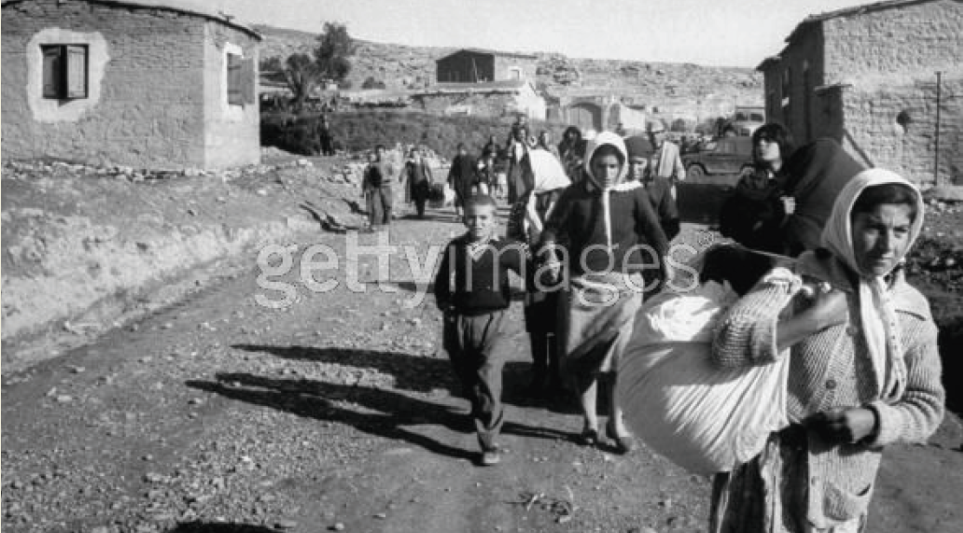
In 1963, the Turkish Cypriot Men, Women and Children were driven of their villages and forced to leave their homes with only their clothes and a small bundle of possessions in their hands by the Greek Cypriot Eoka gangs and mobs.
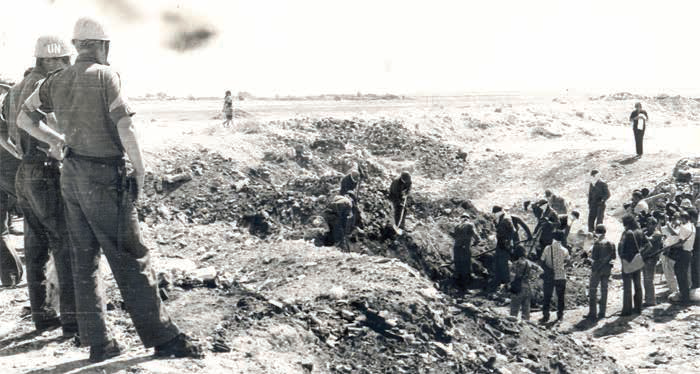
The Turkish Cypriots, Men, Women and Children massacred in their village at Muratağa (Marata) by the Greeks. The U.N soldiers observed the opening of the mass graves after 20th July 1974.
The Vice-President of the House of Representatives to deputize for the President of the House in case of his temporary absence or incapacity to perform his duties. The constitutional provisions regarding separate majorities for enactment of certain laws by the House of Representatives to be abolished.
Unified Municipalities to be established; The administration of Justice to be unified; The division of the Security Forces into Police and Gendarmerie to be abolished.; The numerical strength of the Security Forces and of the Defence Forces to be determined by a Law;
The proportion of the participation of Greek and Turkish Cypriots in the composition of the Public Service and the Forces of the Republic to be modified in proportion to the ratio of the population of Greek and Turkish-Cypriots. The number of the Members of the Public Service Commission to be reduced from ten to five. All decisions of the Public Service Commission to be taken by simple majority. The Greek Communal Chamber to be abolished.
As it can be seen, the proposed changes were aimed at imposing the will and supremacy of the Greek Cypriot majority on the Turkish Cypriot minority.
http://www.kypros.org/Cyprus_Problem/13_points.html — 25/08/2011
Naturally, these proposals were totally unacceptable to the Turkish Cypriot Community. Following the Turkish Cypriots refusal of these proposals, Archbishop Makarios and the Greek Cypriots put the Akritas Plan into operation. “The plan’s course of action was to firstly persuade the world community that too many rights had been given to the Turkish Cypriots and the constitution had to be re-written if the government was to be workable. The big players such as Britain and the US had to be convinced that the Turkish Cypriots need have nothing to fear from Greek Cypriot political dominance of the island. The next step of the plan was to cancel international treaties that existed to safeguard the republic. If a way could be found to legally dissolve the treaties, then Union with Greece would be possible.
The Treaties and Guarantees had been put into place by Britain, Greece and Turkey. They existed to safeguard the Republic and to protect the rights of the Greek and Turkish Cypriots. The plan stated that if the Turkish Cypriots objected the changes and “attempted to block them by force,” then they should be ‘’violently subjugated before foreign powers could intervene’’
http://en.wikipedia.or/wiki/Akritas_plan – 25/08/2011
After the Greek Cypriots put the final part of the Akritas Plan into operation and ousted the Turkish Ministers from the Government, wrecked the Cyprus Republic and started to violently subjugate the Turkish Cypriots on 21st December 1963, Turkey, as one of the guarantors of the Cyprus Republic, did not envisage that this abnormal situation and killings of the Turkish Cypriots would have gone on for so long, and in order to hasten the United Nations Peace keeping Force to come to Cyprus in the shortest possible time to stop the killing of the Turks, was compelled to accept the United Nation Security Council Resolution 186 in March 1964, which confirmed the continuation of the sovereignty of the Cyprus Republic.
(See: U.N. Security Council Resolution, 186 (1964), (1),
Call upon all Member States, in conformity with their obligations under the Charter of the United Nations, to refrain from any action or threat of action likely to worsen the situation in the sovereign Republic of Cyprus, or to endanger international peace. (2), Asks the Government of Cyprus, which has the responsibility for the maintenance and restoration of law and order, to take all additional measures necessary to stop violence and bloodshed in Cyprus. (3), (4), Recommends the creation, with the consent of the Government of Cyprus, of a United Nations Peacekeeping Force in Cyprus, etc. (5), (6), (7), (8) of 4 March 1964 (S/5575).

Exchange of Population Agreement signed by the Turkish Cypriot leader Rauf R. Denktas and by the Greek Cypriot leader Glafkos Clerides on the 02.08.1975 in Vienna. In the picture also the U.N General Secretary Kurt Waldheim.
It is for this reason that under the 186 (1964) of the Security Council Resolution, the Greek Cypriots have been able to keep the recognition and the title of the Cyprus Republic to date.
It was not enough that the Greek Cypriots had wrecked the Cyprus Republic. On the 15th of July 1974 with the approval of the military junta in Greece and with the help of soldiers from the Greek army in Cyprus, they first ousted the so called Cyprus President Archbishop Makarios III, and then toppled the Greek Cypriot Administration and killed many Greek Cypriots. They then turned their killings onto the Turkish Cypriots.
Faced with such a catastrophic situation and the threat that the Turkish Cypriots were about to be massacred, Turkey was forced to intervene to protect the Turkish Cypriots and to restore law and order under the rights given to her by the Cyprus Treaty of Guarantee, under Articles 2 and 3 of 16 Aug. 1960.
ARTICLE 2:
Greece the United Kingdom and Turkey, taking note of the undertakings by the Republic of Cyprus embodied in Article 1, recognize and guarantee the independence, territorial integrity and security of the Republic of Cyprus, and also the provisions of the basic articles of its Constitution. They likewise undertake to prohibit, as far as lies within their power, all activity having the object of promoting directly or indirectly either the union of the Republic of Cyprus with any other State, or the partition of the Island.
ARTICLE 3:
In the event of any breach of the provisions of the present Treaty, Greece, the United Kingdom, and Turkey undertake to consult together, with a view to making representations, or taking the necessary steps to ensure observance of those provisions. In so far as common or concerted action may prove impossible, each of the three guaranteeing Powers reserves the right to take action with the sole aim of re-establishing the state of affairs established by the present Treaty.
www.cypnet.co.uk/ncyprus/history/republic/try-huarantee.html — 19/07/2011
After the Intervention of Turkey in July 1974 and following the Exchange of Population Agreement signed by the Turkish Cypriot leader Rauf Raif Denktas and the Greek Cypriot leader Glafkos Clerides on the 2nd of August 1975 in Vienna, the Turkish Cypriots live in the North and the Greek Cypriots live in the South of the island.
The Greek Cypriots always rejected the Peace Plans. However, before and after 1974, the Turkish Cypriots and Turkey have always tried to find and reach a fair settlement in Cyprus and it has always been the Greek Cypriots who have rejected a settlement.
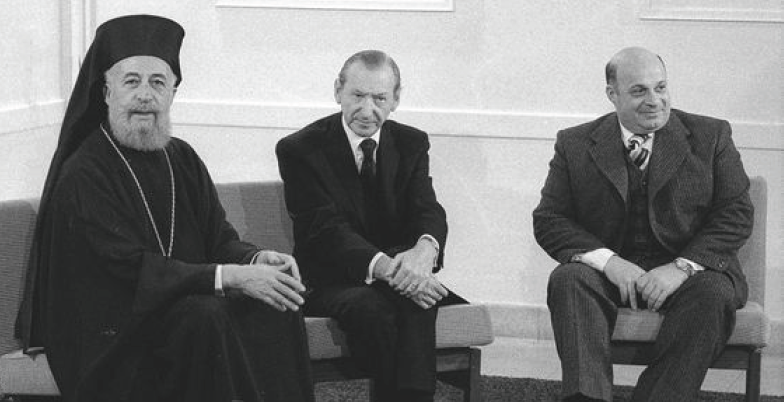
1977 High Level Agreements signed by the Turkish Cypriot leader Rauf R. Denktas and by the Greek Cypriot leader Archbishop Makarios with the U.N. Secretary General Kurd Waldheim.
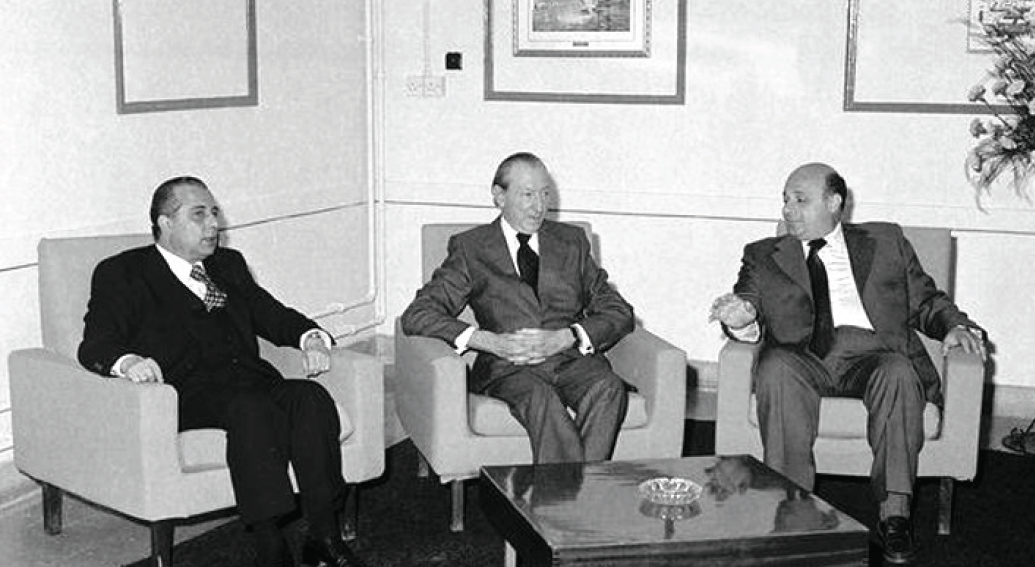
1979 High Level Agreements signed by the Turkish Cypriot leader Rauf R. Denktas and by the Greek Cypriot leader Spyros Kyprianou. In the picture also the U.N. General Secretary General Kurt Waldheim. Kyprianou rejected U.N Peace Plans of “Evaluation of Waldheim” in 1981 and “Consolidated Documents of Perez De Cuellar” in 1986.
The prime examples of these are, the U.N former Secretary General Kurd Waldheim’s “1981 Evaluation of Waldheim – Interim Agreement” was frustrated by the late Greek Cypriot leader Spyros Kyprianou by not holding face to face talk with the Turkish Cypriot leader Rauf R. Denktas alleging that this would bring Mr. Denktas on an equal footing.
Again the United Nation former Secretary General, Perez de Cuellar’s Consolidated Documents were rejected by the late Greek Cypriot Political leader, Spyros Kyprianou, in 1985 – 86 and, Secretary General Butros Gali’s Set of Ideas was rejected by the Greek Cypriot Political leader George Vasilliou in 1992. Finally, the United Nations Cyprus Peace Plan (Annan Plan), in the 24th April 2004 Referendum was rejected by the Greek Cypriot’s Political Leader the late Tassos Papadopoulos, Dimitris Christophias, by other political leaders and by the Greek Cypriot People. These are all prime examples of the Greek Cypriot’s uncompromising attitudes in not wanting to reach a settlement with the Turkish Cypriots.
The above information is taken from the article of Nicos Rolandis, a former Greek Cypriot Foreign Minister, in The Bridge Magazine – An appeal to the Greek Cypriots.
(http://www.bridge-mag.com/magazine/index.php?option=com_content)
Due to the effective lobbing power of the Greek Cypriots and again because the Greek Cypriots have the recognition of the Cyprus Republic in their hand, until the 24.04.2004 referendum, the Turkish side was always seen as the side not wanting a peaceful settlement in Cyprus and the Greek side was always seen as the side wanting peace and a settlement in Cyprus.
This wrong impression continued until 2004 when the Turkish Cypriots voted 65% yes to United Nation Peace Plan (Annan Plan) in Cyprus and the Greek Cypriots with 75% rejected this Peace Plan.
This showed the Greek Cypriots true face!! However, after the referendum, despite the growing sympathy shown to the Turkish Cypriots by the World Nations, and the resolution passed by the European Union Commission on the 26 of April 2004 to lift the isolations on the Turkish Cypriots, these promises unfortunately have not been kept.
Quite the contrary on the 1st May 2004 the Greek Cypriots were accepted as a member to the European Union, contrary and against the strict conditions of the 16th August 1960, Cyprus Treaty of Guarantee as written below and the isolations on the Turkish Cypriots have still not been lifted!!
ARTICLE 1
The Republic of Cyprus undertakes to ensure the maintenance of its independence, territorial integrity and security, as well as respect for its Constitution.
It undertakes not to participate, in whole or in part, in any political or economic union with any State whatsoever. With this intent it prohibits all activity tending to promote directly or indirectly either union or partition of the Island.
It is sad and ironic to see that, whilst the Greek Cypriots are enjoying the membership of the European Union, the Turkish Cypriots who were the co-founder and equal partner of the Cyprus Republic now having embargoes and isolations imposed upon them by the European Union and by the other countries.
In the inter-communal negotiations, the Greek Cypriots, instead of taking into account the events that have taken place during the past 48 years and trying to come to a fair and lasting settlement with the Turkish Cypriots, and after having rejected the United Nations Peace Plan (Annan Plan) on 24th April 2004, they made it their aim to target the collapse of the Turkish Cypriots economy. They believed that an economically weak Turkish Cypriot side would accept the terms of the Greek Cypriots in the negotiations.
In order to achieve this aim, they exerted their pressure and used their veto power in the European Union not to implement the 26th April 2004 European Commission Decision to lift the isolation on the Turkish Cypriots. They also, intensified their legal attacks on Turkey in respect of Land and ownership matters in Cyprus.
The legal success of the Greek Cypriots on the 28th of November 1996 in the case of Titina Loizidou v. Turkey Case No: 40/1993/435/514 at the European Court of Human Rights and on the 22nd of December 2005 in the case of Xenides-Arestis , Case No: 46347/99 again at the European Court of Human Rights led them to believe that the Turkish Cypriots and Turkey would yield. These decisions put the Greek Cypriots during these negotiations, into a more uncompromising stand.
After the decision in the Demopoulos case was given, the legal arguments of the Greek Cypriots claiming back all their immovable properties left in the TRNC and their strategy in relation to property matters in the negotiations collapsed.
Turkey accepted the Jurisdiction of the European Court of Human Rights on the 22nd of January 1990. Due to the fact that the cause of action of the Loizidou case occurred in 1974, which was prior to the date Turkey accepted the jurisdiction of the European Court of Human Rights and also the same cause of action having occurred in the TRNC but, outside Turkish territory, Turkey argued that the jurisdiction of the court did not cover the Loizidou case in accordance with the European Convention on Human
Rights, Article 46, for this reason Turkey thought that they should not have been bound by it.
Although in the present case the objection ratione temporis was raised by the Turkish Government, in the proceedings before the Commission, there was no discussion or analysis in its admissibility decision of 4 March 1991 as to whether the matters complained of involved a continuing situation or an instantaneous act.
This argument of Turkey was not accepted by the European Court of Human Rights on the grounds that, Turkey had a military force in North Cyprus and the TRNC was considered a Subordinate Local Administration of Turkey and that due to the reason that the alleged violation was not an instantaneous act but was a continued one,
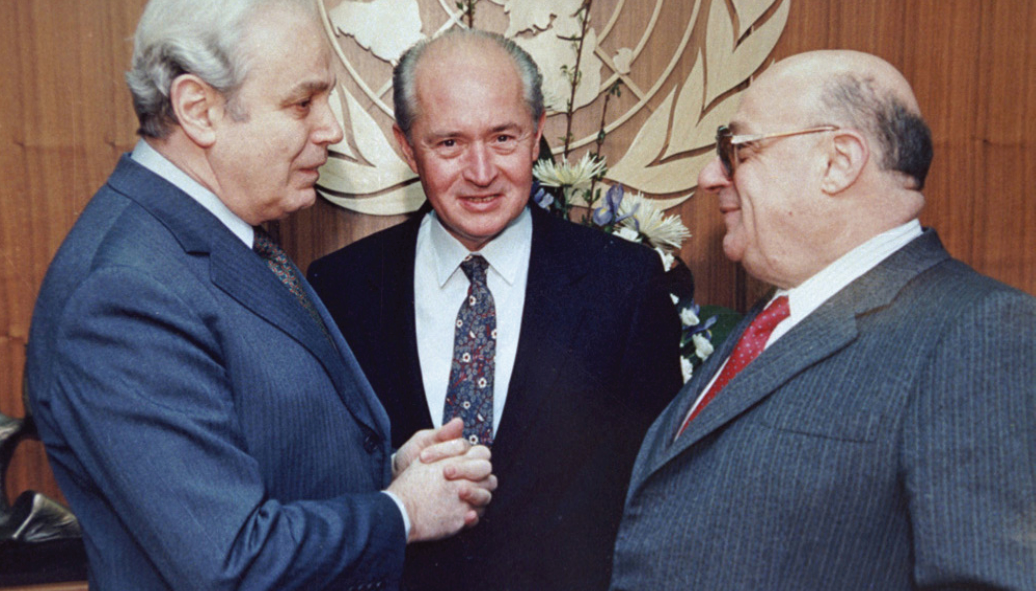
The founding president of the TRNC Rauf R. Denktas, Greek Cypriot leader George Vasiliou and the U.N. Secretary General Presez de Cuellar. Vasiliou, rejected U.N Peace Plan of ‘Boutros Ghali’s Set of Ideas’ in 1992.
Turkey did violate the rights of Loizidou under Article 1 Protocol 1 of the Convention as states, “The High Contracting Parties shall secure to everyone within their jurisdictions the rights and freedoms defined in Section 1 of this Convention.” Eventually Titina Louzidou and the Greek Cypriots won this case.
The Greek Cypriots continued their legal successes in the European Court of Human Rights until 18th March 2010 up to the Demopoulos decision. Following the Greek Cypriot’s legal successes on the property matters in the Titina Loizidou and Xenides Arestis cases, they also had another legal success in the case of David – Linda Orams in Brussels. In this case first, Master Eyre of the Queen’s Bench Division, on the 21st October 2005 ordered the registration of the South Nicosia Greek Court’s Judgement
in the name of Meletios Apostolides for the Registration, Recognition and Enforcement of Judgement under European Council Regulation (EC) No: 44/2001 in the United Kingdom.
However, following an appeal by David – Linda Orams against this registration order, the appeal was allowed by Justice Jack on the 6th of September 2006 and the registration was set aside.
So the British couple won the first round of the legal battle. However, Mr Justice Jack’s decision was appealed by Meletios Apostolidies to the Court of Appeal under the case number of A2/2006/2114).
The British Appeal Court, by an order dated 26th June 2007 referred it to the European Court of Justice for a ruling on issues raised on five questions. These questions were mainly relating to Protocol No: 10 of the Act of Accession 2003 of Cyprus to the E.U and the question was; does the suspension of the acquis communautaire in the Northern area of Cyprus preclude the Recognition and Enforcement of a South Nicosia Court Judgement in relation to an immovable property in the North of Cyprus, in another E.U. Country?
In this case, the Greek Cypriots eventually got the benefit of being a member of the European Union. Whereby, under the European Council Regulation (EC) No: 44/2001, and with the strong legal advice of the Advocate General Julian Kokott in favour of Apostolides and the Greek Cypriots, to the European Court of Justice. The answers from the European Court of Justice whose president was a Greek Judge named Vasillios Sokouris to the British Court of Appeal was given on the 2nd of May 2009 in favour of the Greek Cypriot Apostolidies.
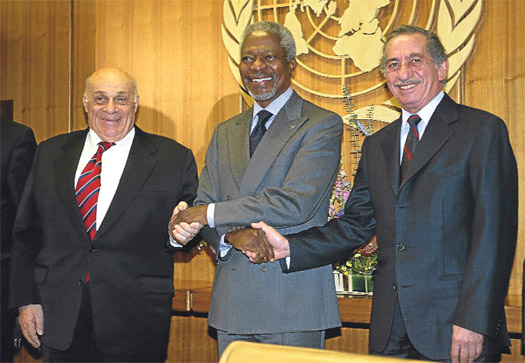
Despite the smile on his face and handshake, the Greek Cypriot leader Tassos Papadopoulos and the Greek Cypriot people rejected the U.N General Secretary ‘‘Annan’s Peace Plan’’ in the referandum held on the 24.04.2004 by 75%. ( In the picture, TRNC faunding president Rauf R. Dektaş, the Greek Cypriot’s leader Tassos Papadopoulos and the U.N General Secretary Kofi Annan)
Finally the British Court of Appeal judges Lord Justice Pill, Lord Justice Lloyd and Sir Paul Kennedy gave their judgement on the 19th of January 2010 in favour of the Greek Cypriot Meletios Apostolides. In that the South Nicosia Greek Cypriot decision can be registered in the United Kingdom and can be recognized and be enforced. Consequently, these legal successes made the Greek Cypriots strengthen their uncompromising stand in the negotiations.
Until the Demopoulos case, in all Human Rights Court’s decisions, the main principle was to confirm that the Greek Cypriots were the legal owners of the lands left by them in 1974 in the Turkish Republic of North Cyprus and also to confirm that, their Greek Cypriot owners were entitled to return to their lands and to claim all their properties back from the Turkish Cypriots.
The Greek Cypriot continued their beliefs and arguments on land ownership and property matters until 18th of March 2010 when the European Court of Human Rights gave the Decision in the case of Demopoulos and others v. Turkey, case no’s: 46113/99, 3843/02, 13571/02, and 13466/03 cases. Now, after this case and decision, the legal arguments of the Greek Cypriots claiming back all their immovable properties left in the TRNC collapsed.
Following this decision, although, the pre-74 Greek Cypriot owners were still considered to be the owners of the lands left in the North of the island, it was now up to the Respondent state (Turkey) as to how it would redress those owners. We therefore should look into this Demopoulos v. Turkey case and its decision in detail and see what principles and precedents this case brought in favour of the Turkish Cypriots and Turkey. Here below is some information extracted from the Judgement of The European Court of Human Rights, Takis Demepoulos and the Others v. Turkey case.
114. “The Court’s case-law indicates that if the nature of the breach allows restitutio in integrum, it is for the respondent State to implement it. However, if it is not possible to restore the position, the Court, as a matter of constant practice, has imposed the alternative requirement on the Contracting State to pay compensation for the value of the property.
This is because the Contracting Parties to a case are in principle free to choose the means whereby they will comply with a judgment in which the Court has found a breach. This discretion as to the manner of execution of a judgment reflects the freedom of choice attaching to the primary obligation of the Contracting States under Article 1 of the Convention to secure the rights and freedoms guaranteed under the Convention”.
116.“The Court must also remark that some thirty-five years after the applicants, or their predecessors in title, left their property, it would risk being arbitrary and injudicious for it to attempt to impose an obligation on the respondent State to effect restitution in all cases, or even in all cases save those in which there is material impossibility, a suggested condition put forward by the applicants and intervening Government which discounts all legal and practical difficulties barring the permanent loss or destruction of the property.
It cannot agree that the respondent State should be prohibited from taking into account other considerations, in particular the position of third parties. It cannot be within this Court’s task in interpreting and applying the provisions of the Convention to impose an unconditional obligation on a Government to embark on the forcible eviction and re-housing of potentially large numbers of men, women and children even with the aim of vindicating the rights of victims of violations of the Convention”.
117. “The Court has stated that it is still necessary to ensure that the redress applied to those old injuries does not create disproportionate new wrongs. Thus, there is no precedent in the Court’s case-law to support the Proposition that a Contracting State must pursue a blanket policy of restoring property to owners without taking into account the current use or occupation of the property in question”.
118. “Thus, the Court maintains its view that it must leave the choice of implementation of redress for breaches of property rights to Contracting States, who are in the best position to assess the practicalities, priorities and conflicting interests on a domestic level even in a situation such as that pertaining in the northern part of Cyprus. No problem therefore arises as regards the impugned discretionary nature of the restitutionary power under the Law 67/2005”.
V. CONCLUSION
127. “The Court finds that Law 67/2005 provides an accessible and effective framework of redress in respect of complaints about interference with the property owned by Greek Cypriots. The applicant property owners in the present cases have not made use of this mechanism and their complaints under Article 1 of Protocol No. 1 to the Convention must therefore be rejected for non-exhaustion of domestic remedies.
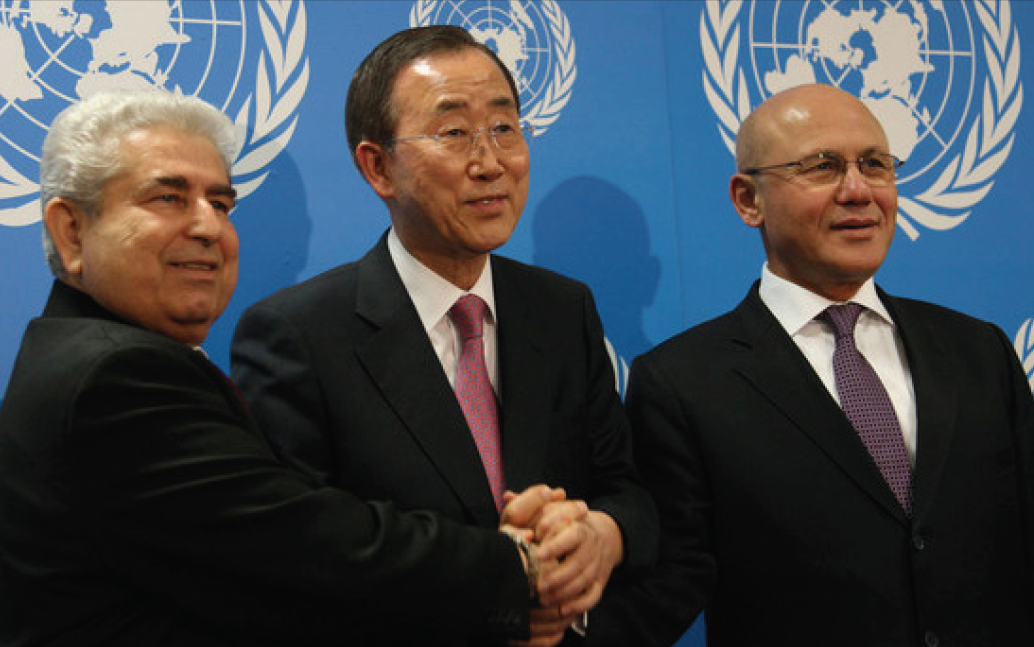
TRNC 2nd President Mehmetali Talat and the Greek Cypriot leader Dimitis Christophias with the U.N Secretary General Ban ki- Moon. The present negotiations are continuing on the Joint Statement issued on the 23rd May 2008 by Talat and Christophias.
It is satisfied that Law 67/2005 makes realistic provision for redress in the current situation of occupation that is beyond this Court’s competence to resolve”.
128. “Lastly, it would stress that this decision is not be interpreted as requiring that applicants make use of the IPC. They may choose not to do so and await a political solution. If, however at this point in time, any applicant wishes to invoke his or her rights under the Convention, the admissibility of those claims will be decided in line with the principles and approach above. The Court’s ultimate supervisory jurisdiction remains in respect of any complaints lodged by applicants who, in conformity with the principle of subsidiary, have exhausted available avenues of redress”.
129. “The Court concludes that this part of the application must therefore be rejected pursuant to Article 35 section 1 and 4 of the Convention”.
The conclusion which can be drawn from this European Court of Human Rights decision is that, Demopoulos who had left property in Güzelyurt (Morphou) or any other applicants who have left property in any other place in the area of the TRNC should make their application to the Immovable Property Commission and that the Commission can offer them Compensation or set off land from the Lands the Turkish Cypriots left in the South if asked for, and in some cases can offer the restitution of their properties considered by the court as being a valid and lawful domestic (local) remedy.
Again as a further conclusion, after the European Court of Human Rights Demopoulos Decision, and the new principles laid down in this case, in the inter communal negotiations, the foundation of claiming that all Greek Cypriots were entitled to return to their properties in the North of the island lost its validity and legitimacy. With this decision as mentioned in paragraph 128, it now brought restrictions on the Greek Cypriots when it came to referring to their property claims. If they had not been dealt with and had not past the Admissibility stage, they were directed to make their claims to the Immovable Property Commission.
Therefore about 1400 property cases, waiting in the European Court of Human Rights against Turkey, have been directed to be referred to the Immovable Property Commission in the TRNC. From now on anyone not satisfied with the decision of IPC can appeal against their decision to the High Administrative Court in the TRNC and thereafter anyone who is not satisfied with the High Administrative Court’s Decision will be deemed to have exhausted the local remedy and thereafter will be entitled to take the TRNC High Administrative Court’s Decision to the European Court of Human Rights.
In other words, although the European Court of Human Rights consider the Parliament, Executive and Judiciary of the TRNC, as being the subordinate local administration of Turkey, nevertheless as a Grand Chamber Decision, the acceptance of the Immovable Property Commission and the High Administrative Court formed under the Constitution of the TRNC and its decisions as a Local
Remedy under the Article of 35 of the Convention gave great respect to the TRNC and to Turkey in International Relations.
However, the TRNC Government and Turkey should always remember that the working practices of the Immovable Property Commission should not lead the commission to cease to be a domestic remedy. The law 67/2005 should provide an accessible and effective framework of redress in respect of complaints about interference with the property owned by Greek Cypriots. That is to say, the applications to the commission should be dealt with efficiently, decisions should be given fairly and within a reasonable time and that the decisions of payment of compensations, set off or restitution of property should be carried out without any undue delay.
Otherwise, if the European Court of Human Rights stops seeing the IPC as a domestic remedy, nothing stops the Human Rights Court to resume seeing the property complaints of the Greek Cypriots again. The big answer to the question everyone would like to know: What are the chances of the Turkish and the Greek Cypriots coming to a fair and lasting settlement in Cyprus?
As a conclusion, the inter-communal negotiation between the two communities which started in 1968 with the Turkish Cypriot leader Rauf Raif Denktas and Greek Cypriot leader Glafkos Clerides and continued with Denktas and with Greek Cypriot leaders Makarios III and with Spyros Kyrianou in the Nineteen Seventies resulted with “4 Points High Level Agreements (1977)” and with
“10 Points High Level Agreement (1979)”.
Both Agreements mainly set the principles that a solution for Cyprus will be based on a bi-zonal and bi-communual Federal Government. Ever since, the negotiations have been taking place under the auspices of the United Nations, based on these main principles. During these periods, the parameters created by the U.N also are that, the bi-communual and bi-zonal Federal Government will be based on the political equalities of both communities.
12 March 1990 – U.N Security Council Resolution 649. Section 3: “Calls upon the leaders of the two communities to pursue their efforts to reach freely and mutually acceptable solution providing for the establishment of a federation that will be bi-communual as regards the constitutional aspect and bi-zonal as regards the territorial aspect, in line with the present resolution and their 1977 and 1979 high-level agreements, and to-cooperate, on an equal footing, with the Secretary-General in completing, in the first instance and on an urgent basis, an outline of an overall agreement, as agreed in June 1989”.
In these talks, the Turkish side is seeking the continuation of the 1960 Treaty of Guarantee, providing the Turkish Cypriots an effective guarantee of Turkey, whereas, the Greek Cypriots are seeking to obtain some new guarantees from the U.N or the European Union.
The present negotiations between the two communities are held between the Turkish Cypriot President Dervish Eroglu and the Greek Cypriot leader Dimitris Christophias. These ongoing negotiations are now continuing on the Joint Statement issued by the second TRNC President Mehmetali Talat and the Greek Cypriot leader Dimitis Christophias on the 23rd of May 2008 reaffirming that the settlement between the communities will be based on a bi-zonal, bi-communual federation with political equality, as defined by relevant UN Security Council Resolutions.
This partnership will have a Federal Government with a single international personality. The Turkish Cypriots and Turkey stressing that this Federal Government which will have a single international personality will be comprised of two new a Turkish and a Greek Cypriot Constituent States.
The recent developments on the Cyprus issue is that, the Secretary General of the U.N Ban Ki-Moon met TRNC president Derviş Eroğlu and Greek Cypriot leader Dimitris Christophias on the 7th July 2011 at Geneva, Switzerland and urged the two leaders to narrow their differences on all core issues in the intercommunal negotiations before holding talks in New York in October.
The secretary General reiterated that the progress in the negotiations has been too slow and asked both sides to intensify the negotiations until October 2011. He further stated that the UN was prepared to offer “ enhanced involvement ” without changing the fact that the central principle of the negotiations is a Cypriot initiative.
Ban Ki-Moon confirmed that the leaders of both communities have accepted his offer. In these talks, six issues were negotiated, namely: the relations with the European Union, economy, governance, property, security and territory. The secretary General expressed his expectations from the leaders,
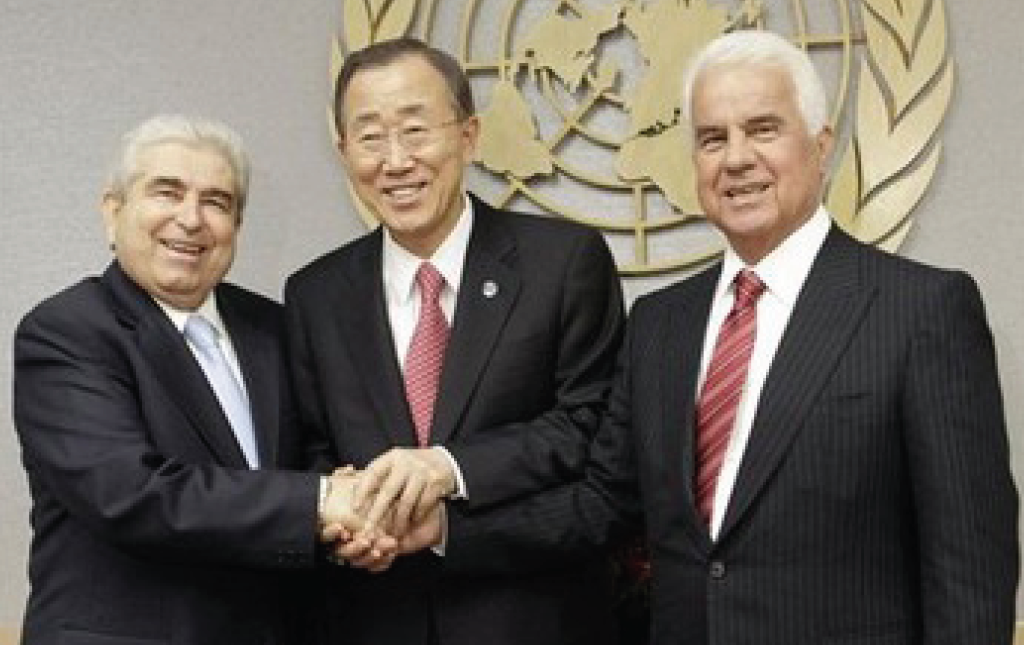
TRNC President Dervis Eroğlu and Greek Cypriot Leader Dimitris Christophias with the U.N General Secretary Ban ki-Moon. The negotiations were held between Eroglu and Christophias.
that he hopes they will reach convergence on all core subject before the planned October meeting at the United Nations in New York, so that this could pave the way towards convening a final international conference.
Ban Ki-Moon also told the leaders that, they should start preparing their people to accept a settlement so that a result of YES vote can come out from both communities in a referendum which was planned to take place in early 2012.
However, It is worth mentioning that according to various survey reports conducted in South Cyprus, the vast majority of the Greek Cypriot do not accept to share the Cyprus Republic and they do not want to live together on an equal bases together with the Turks under a Federal Government.
The situation in the North of the island is that, the Turkish Cypriots who voted Yes to the United Nation Peace Plan (Annan Plan) in the April 2004 referendum are now anxious and also hesitant to come together with the Greek Cypriots under a Federal Government. Obviously, both communities need a lot of encouragement to change their mind in the direction of persuading them to come together and to live under a Federal Government Ban Ki-Moon made both communities and their leaders aware that, the efforts of the United Nations finding a settlement for Cyprus is not endless and that the good offices of the U.N for such assistance may be withdrawn.
However, after the Geneva meeting, there were cautious optimism on the Turkish and less hope on the Greek side that, with the intense negotiations which it was decided were to be held twice a week until October, before the planned meeting at New York, the communities may reach convergence on the core issues and so pave the way for an international conference and a referendum to be held in early 2012.
However, it is widely speculated now that, the massive gunpowder explosion at Evangelos Florakis naval base in Southern Cyprus on the 11th of July 2011 killing 13 people, including naval base commander, Andreas Ioannides and also injuring over 60 people could weaken the negotiating strength of the Greek Cypriot leader Dimitris Christophias, as the Greek Cypriot people are putting mainly the blame on him.
The blast seriously damaged the surrounding area and knocked out the Vassilikos power plant which produces nearly 60% of Southern Cyprus electricity. It is estimated that this blast caused over three billion Euros worth of damages to the Greek Cypriots economy, especially to their tourism sector which left the industry with constant electricity cuts in the peak summer holiday time.
The Turkish Cypriot President Dervis Eroglu was quick to offer electricity supply from the North to the Greeks in the South and after some talks , the Turkish Cypriots started sharing their electricity supply a week later after the blast took place. This clearly shows that, rather than hatred or animosity, there are a lot of good things which may be shared by the communities including the much needed water supply on this dry island which is planned to be brought to North Cyprus from Turkey in the next few years.
The political circles are trying to evaluate as to what impact this catastrophic blast might have in the Cyprus negotiations. Some observers in world politics and at the U.N fear that, after the 11th July blast, the credibility of Dimitris Christophias and respect for him among his people might be weakened thus reducing his ability to take firm decisions in the negotiations. Under such circumstances the ongoing negotiations will go no where. Perhaps it is the right time that, the world leading countries such as the U.S.A, Russia, the European Union and their mother land Greece should urge the Greek Cypriots to stop their animosity towards the Turkish Cypriots and to Turkey and make them realise that there is a lot of good and common interest to share and cooperate with the Turkish Cypriots for the benefit and harmony of both communities. They should look at recent history and see
how, the Greek People in Greece and Turkish People in Turkey, stopped their animosity of a hundred years and helped each other and even if not very close, developed friendship after the big earthquakes that took place on the 17 August 1999 in Turkey and on the 7th September 1999 in Greece.
Greek Cypriots recent unreasonable behaviours and negative attitudes may yet again derail the inter-communal negotiations and deteriorate the relationship between Turkey and Greece.
It is regretted that, the recent course of action taken by the Greek Cypriots does not help the negotiations at all. The most recent damaging development to the communal relationship is that, unlike the Greek Cypriot’s administration which always alleged that it was the ordinary citizens who were taking legal action against the Turkish Cypriots and Turkey on property and other matters, this time, it is blatantly the Greek Cypriot Administration who issued an European Arrest Warrant against a British National, Garry Robb, who had taken part in property developments on pre-1974 Greek Cypriot land in the TRNC. Garry Robb who has served his sentences in the United Kingdom for drug crimes, and following the Greek Cypriot Administration issuing the European Arrest Warrant, he was handed over by the British Judiciary to the Greek Cypriot authorities in the first week of August 2011.
It is very clear that the prime aim of the Greek Cypriots is not to punish a so called ordinary criminal, but their target is to stop the economic development of the TRNC. In order to achieve this, they are spreading fright to the foreign investors, especially to the Europeans, not to invest in the North of the island on pe-1974 Greek Cypriot Lands and that if they do, they will be prosecuted and be brought to the South of the Island for punishment. Greek Cypriots yet again enjoy the benefit of being a member of the European Union, because according to the law that came into operation on the 1st of January 2004 in the European Union, it forces the member state to comply with the provisions of this law described as below.
“The European Arrest Warrant (EAW) is an arrest warrant valid throughout all member states of the European Union (EU). Once issued by a member state, it requires the receiving Member State to arrest and transfer a criminal suspect or sentenced person to the issuing state so that the person can be put on trial or complete a detention period. Extradition must take place within 90 days of arrest or within 10 days if the arrested person consents to surrender. An EAW can only be issued for the purposes of conducting a criminal prosecution (not merely an investigation), or enforcing a custodial sentence. It can only be issued for offences carrying a maximum penalty of 12 months or more. Where sentence has already been passed an EAW can only be issued if the prison term to be enforced is at least four months long”.
http://en.wikipedia.org/wiki/European_Arrest_Warrant— 25/08/2011
It must be noted that the issue of an European Arrest Warrant is not an administrative matter and does not give a discretionary right or power but is a judicial matter of which once the requirement of the law are satisfied the judiciary is compelled to comply with it. It is worth remembering that, as it is analysed, relevant specific clauses in the European Court of Human Rights, Demopoulos decision, quoted in the above paragraphs, even the European Court of Human Rights has recognized that the problem between the Turkish and Greek Cypriots and the property matters is a historical and political one and that it must be solved through negotiations between the two communities rather than by the courts. However, the Greek Cypriots when it suited them have applauded the decisions of the European Court of Human Rights up to the Demopoulos case but now they are turning their backs on this respectable court and its decision on the Demopoulos case.
The use of the weapon of the European Arrest Warrant by the Greeks is against the principles laid down by the European Court of Human Right in the Demepoulos case and its decision.
The latest tactics of the Greek Cypriot Administration using the facility of the European Arrest warrant will not work and will not make the TRNC Government yield to the unjust demands of the Greek Cypriots.
It will not bring much to the Greek Cypriots just as it did not bring much benefit in the cases of Titina Loizidiou, Xenides Arestis and David – Linda Orams, other than frightening some intended European investors into not making investments in the North.
It looks as if the Greek Cypriots instead of trying to reach a Federal settlement want to derail the inter-communal negotiations and put the blame on the Turkish Cypriots and on Turkey thus enabling them not to share but continue owning the internationally recognized Cyprus Republic themselves and themselves alone.
But contrary to the expectations of the Greek Cypriots, investments in the TRNC will not stop and investors from Turkey and other none European countries will fill the vacuum.
We are witnessing that this is what is happening in the last 3-4 years. However, it is certain that if the Greek Cypriot Administration continues to use the weapon of the European Arrest Warrant, in the end, this policy will have a boomerang effect and hit also the troubled economy of the Greek Cypriots. Thousand of Europeans who have purchased homes in the TRNC and over 100 thousand
Turkish Cypriots living abroad will stop using the Greek Planes. The Turkish Cypriots living in the TRNC might also get frightened from this European Arrest Warrant issue and not go shopping and spend millions of Euros in the South of the island.
However, no matter as to what economical consequences may come out from the latest Greek Cypriots tactics; it is the duty of the TRNC State to protect her citizens and the foreign nationals who are using or have made investments in the Pre-1974 Greek Cypriot lands in the North of the island from such Greek Cypriots attacks. Therefore President Dervis Eroglu and the TRNC Government should call the Greek Cypriot Administration to stop such actions.
Furthermore, President Dervis Eroglu, and the TRNC Government together with the Political Parties and civil organizations should start a campaign explaining to the U.N, the member States of the Security Council, European Union and Islamic Nations that what the Greek Cypriot Administration is doing is dangerous and may create a friction between the communities leading to a more dangerous situation and consequences.
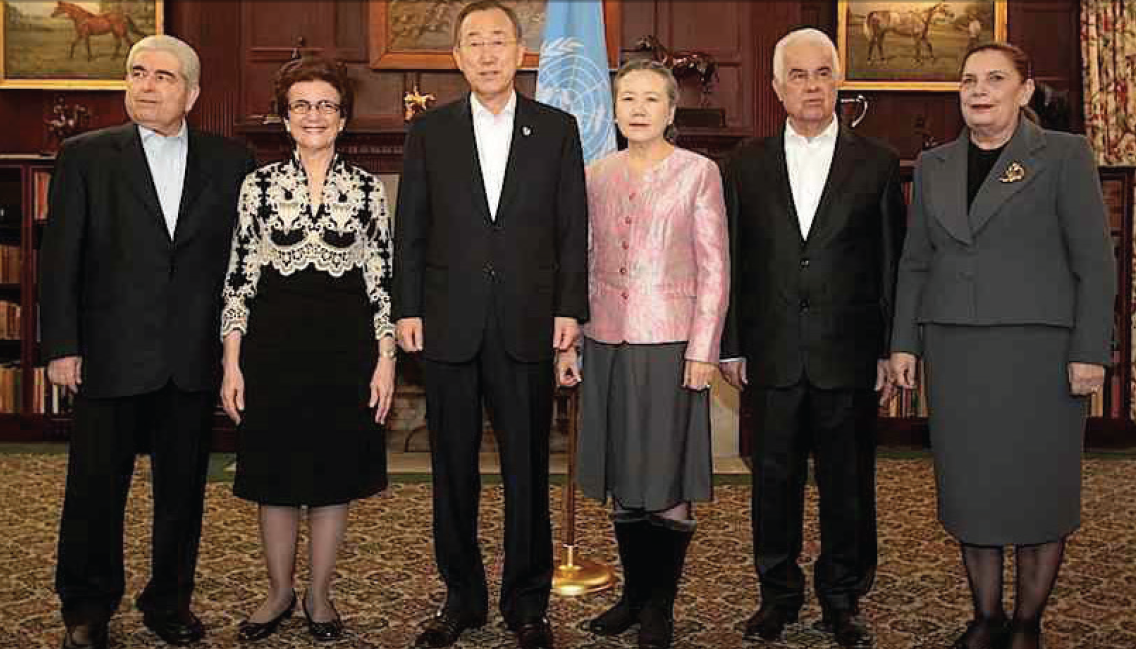
The fifth tri-lateral meeting held on the 23 and 24 of January 2012 between the TRNC President Dervis Eroglu (in the picture with his wife Meral Eroglu) and the Greek Cypriot leader Demetris Christophias (in the picture with his wife Elsie Christophias) with the U.N Secretary General Ban ki-Moon ( in the picture with his wife Yoo (Ban) Soon – taek) at Greentree Estate in New York, produced no result towards the settlement of the Cyprus Problem. Now, the negotiations between the Turkish and Greek Cypriot people have been postponed until after the Greek Cypriots’ Presidential Elections in February 2013.
The Greek Cypriots and the Worlds Nations must be reminded that after the exchange of population took place in 1975 and starting from 1977 and 1979 under High Level Agreements between the two communities, it was agreed and understood that the settlement in Cyprus would be based on a bi-communual and bi-zonal Federal Government.
That is to say, the lands of the Turkish Cypriots in the South should be left to the Greek Cypriots and the land of the Greek Cypriots in the North of the island should be left to the Turkish Cypriots (the discussion of 28/2 or 29 + ratio – 1992 U.N Secretary General Boutros Ghali’s Set of Ideas) through negotiations. It is very wrong and ironic that after 38 years of exchange of populations and talks on the property matters, the Greek Cypriot Administration is starting criminal prosecution
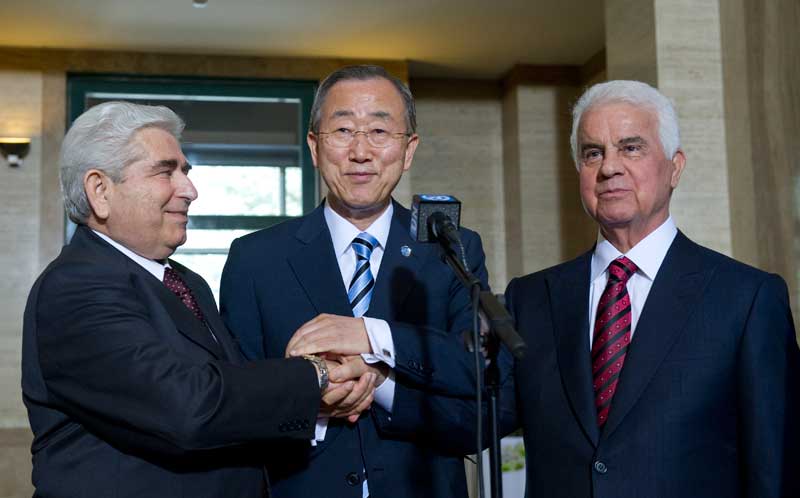
TRNC President Dervis Eroğlu and Greek Cypriot Leader Dimitris Christophias with the U.N General Secretary Ban ki-Moon. The negotiations were held between Eroglu and Christophias. But unfortunately they could not bring the Cyprus Problem to a final settlement.
and using the weapon of the European Arrest Warrant against the TRNC citizen and foreign national who are using or developing pre-1974 Greek Cypriot lands.
This action of the Greek Cypriots is against the 12 March 1990 – U.N Security Council Resolution 649 targeting a settlement based on a bi-zonal and bi-communual federal government between two politically equal communities. It is against the principles of the European Court of Human Rights laid down as in the Demopoulos case and decision. Certainly, it is also against the spirit of the inter-communal negotiation trying to find a settlement for Cyprus.
If they continue with this kind of animosity and vindictive approach to the Turkish Cypriots and to foreign nationals, it will drive the two communities more apart, spoil and even deteriorate or derail the inter-communal negotiations leading to dangerous situations.
Unfortunately, the latest negative and also dangerous act of the Greek Cypriots was to give permission to the foreign companies to search for oil and gas off the South East Coast of the island. This is totally unacceptable to the Turkish Cypriots and also to Turkey. The Greek Cypriots are alleging that they are the Government recognized by the international communities and by the European Union and that they therefore own all the natural resources of the island.
They are ignoring the fact that the Turkish Cypriots were the equal partners and co-founders of the Cyprus Republic and that the Turkish Cypriots also have equal shares in these resources.
This clearly shows that the Greek Cypriots are not the sole owners of the territories (Land, sea and air) of the island and they are not the sole owner of the natural resources of this island.
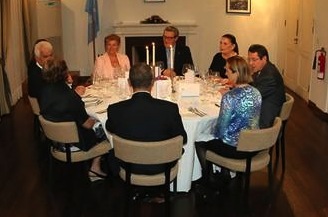
After the Greek Cypriots Presidential Elections held on the 24th February 2013, the TRNC President Dr. Dervis Eroglu met at a dinner on the 30th May 2013 with the newly elected Greek Cypriot leader Nicos Anastasiades hosted by the U.N. Envoy to Cyprus, Alexander Downer at the house of the U.N General Secretary Special Representative Lisa Buttenheim in the buffer zone at Nicosia to resume the long – stalled reunification of Cyprus under a Federal State. However the Greek Cypriot leader Anastasiades put an excuse for not resuming the intercommunal talks until they put their troubled economic situation in order possibly in November, 2013.
The Turkish Cypriots have got equal rights in everything. Therefore, they should refrain from making decisions allowing foreign companies to search for oil and gas in and around the surrounding waters of the island before coming to an agreement with the Turkish Cypriots. It is hoped that the Greek Cypriots do not miscalculate again.
It is hoped that the Greek Cypriots do not exasperate the already unsolved Cyprus problem any further and each community co-operates with the United Nations and Secretary General Ban ki-Moon to find a fair and lasting peace on the island.
Certainly, the establishment of peace in Cyprus will also create stability in the Eastern Mediterranean. The emerging strong economy of Turkey, with the co-operation of Greece, the Turkish and Greek Cypriots will certainly bring wealth to both communities in Cyprus and will also bring stability to the neighbouring countries in the region as well as success to the U.N and harmony within the European Union.
Following the meeting held between the TRNC president Dervis Eroğlu with the newly elected Greek Cypriot leader Nicos Anastasiades at a dinner hosted by the U.N. Envoy to Cyprus, Mr. Alexander Downer on the 30th of May 2013 at the house of the UN Secretary-General’s Special Representative in Cyprus Lisa Buttenheim in the buffer zone at Nicosia; the Greek Cypriots under the pretext of their troubled economic situation used the excuse to postpone the negotiations for a long time.
After all, unlike the Turkish Cypriots who are suffering from isolations for years after the Greek Cypriots illegally and with arm attacks usurped the bi-communal Cyprus Republic in 1963 and whilst now enjoying the benefit of recognized statehood, why should they hurry up for a settlement of the Cyprus problem?
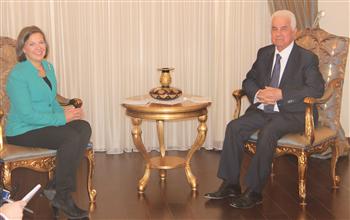
United States of America, the Assistant Secretary of State for European and Eurasian Affairs, Victoria Nuland met with the TRNC President Dervis Eroğlu on the 4th of February 2014.
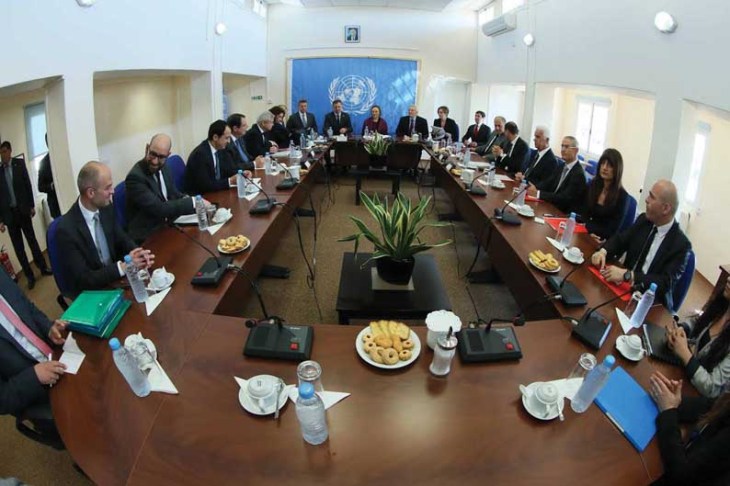
The Turkish Cypriot negotiating team headed by the TRNC President Dervish Eroglu and the Greek Cypriot negotiating team headed by the Greek Cypriot leader Nicos Anastasiades with the UN Secretary-General’s Special Representative in Cyprus Lisa Buttenheim discussing the Joint Declarations on the 11th of February 2014
Due to the rich Hydro Carbon Gas reserves found in the Eastern Mediterranean Sea, in the alleged Economic Exclusive Zone of Cyprus, the United State and European Union wanting to bring these rich Gas Reserves to the European Countries in order to stop these Nations dependency on Russian Gas, they strongly needed to solve this long lasting Cyprus Problem between the Turkish and Greek Cypriots Communities.
With the prospect of bringing the two sides to the negotiation table, the United States of America sent their Assistant Secretary of States for European and Eurasian Affairs to Cyprus Ms Victoria Nuland in early February where she met with the TRNC President Derviş Eroğlu on the 4th of February 2014 and with the Greek Cypriot leader Nicos Anastasiades.
After these meeting the U.S.A Assistant Secretary of State announced that “The two leaders assured me of their strong determination to reach agreement on a joint statement that will define the key principles to foster renewal of fruitful, result-oriented settlement negotiations”.
![Turkish and Greek Cypriots Joint Declaration 11.02.2014]](https://www.ekinoxcomputer.net/wp-content/uploads/2013/07/Turkish-and-Greek-Cypriots-Joint-Declaration-11.02.2014.jpg)
The TRNC president Dervis Eroğlu together with the Greek Cypriot leader Nicos Anastasiades on the 11th February 2014 announcing the Joint Declaration with the UN Secretary-General’s Special Representative in Cyprus Lisa Buttenheim.
Whilst, the United States of America and European Union continued to put their efforts and give encouragement to the two communities to resume the long stalled negotiations, the U.N Secretary General’s Special Representative in Cyprus Lisa Buttenheim brought the two Community leaders together on 11th of February 2014 and the two leaders signed a Joint Declaration laying down the base and the principles for the future negotiations.
Following the announcement of the Joint Declarations, the United States, the European Union, the United Nations and the other leading countries gave their strongest support for this Joint Declaration and for the resumption of the negotiations. White House spokesman Jay Carney praised Greek Cypriot leader Nicos Anastasiades and his Turkish Cypriot counterpart Derviş Eroğlu for their “courage and vision” in reaching a joint statement “which embodies key principles to guide their further work,”
The President of the European Commission, José Manuel Barroso, and the President of the European Council, Herman Van Rompuy, issued that day the following statement:
“The European Union welcomes the agreement announced today by the Greek Cypriot and Turkish Cypriot leaders on a Joint Declaration, which lays a solid foundation for resumption of negotiations for a fair and viable comprehensive settlement of the long-standing Cyprus problem”.
THE JOINT DECLARATION BELOW SIGNED BY THE LEADERS OF THE TWO COMMUNITIES LAID DOWN THE NEW FOUNDATION AND THE PRINCIPLES FOR THE FUTURE INTER – COMMUNAL NEGOTIATIONS.
1. The status quo is unacceptable and its prolongation will have negative consequences for the Greek Cypriots and Turkish Cypriots. The leaders affirmed that a settlement would have a positive impact on the entire region, while first and foremost benefiting Turkish Cypriots and Greek Cypriots, respecting democratic principles, human rights and fundamental freedoms, as well as each other’s distinct identity and integrity and ensuring their common future in a united Cyprus within the European Union.
2. The leaders expressed their determination to resume structured negotiations in a results-oriented manner. All unresolved core issues will be on the table, and will be discussed interdependently. The leaders will aim to reach a settlement as soon as possible, and hold separate simultaneous referenda thereafter.
3. The settlement will be based on a bi-communal, bi-zonal federation with political equality, as set out in the relevant Security Council Resolutions and the High Level Agreements. The united Cyprus, as a member of the United Nations and of the European Union, shall have a single international legal personality and a single sovereignty, which is defined as the sovereignty which is enjoyed by all member States of the United Nations under the UN Charter and which emanates equally from Greek Cypriots and Turkish Cypriots. There will be a single united Cyprus citizenship, regulated by federal law. All citizens of the united Cyprus shall also be citizens of either the Greek- Cypriot constituent state or the Turkish-Cypriot constituent state. This status shall be internal and shall complement, and not substitute in any way, the united Cyprus citizenship.
The powers of the federal government, and like matters that are clearly incidental to its specified powers, will be assigned by the constitution. The Federal constitution will also provide for the residual powers to be exercised by the constituent states. The constituent states will exercise fully and irrevocably all their powers, free from encroachment by the federal government. The federal laws will not encroach upon constituent state laws, within the constituent states’ area of competences, and the constituent states’ laws will not encroach upon the federal laws within the federal government’s competences. Any dispute in respect thereof will be adjudicated finally by the Federal Supreme Court. Neither side may claim authority or jurisdiction over the other.
4. The united Cyprus federation shall result from the settlement following the settlement’s approval by separate simultaneous referenda. The Federal constitution shall prescribe that the united Cyprus federation shall be composed of two constituent
states of equal status.
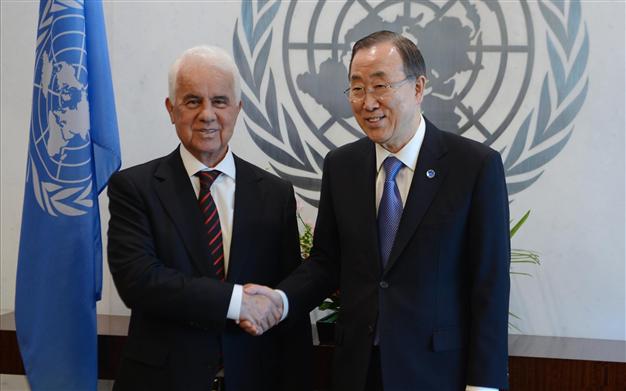
After the Joint Decleration was signed, the TRNC President Derviş Eroğlu made a visit to New York and at his meeting with the U.N. Secretary General Ban Ki Moon on the 21 April 2014 expressed his commitments to the negotiations.
The bi-zonal, bi-communal nature of the federation and the principles upon which the EU is founded will be safeguarded and respected throughout the island. The Federal constitution shall be the supreme law of the land and will be binding on all the federation’s authorities and on the constituent states. Union in whole or in part with any other country or any form of partition or secession or any other unilateral change to the state of affairs will be prohibited.
5. The negotiations are based on the principle that nothing is agreed until everything is agreed.
6. The appointed representatives are fully empowered to discuss any issue at any time and should enjoy parallel access to all stakeholders and interested parties in the process, as needed. The leaders of the two communities will meet as often as needed. They retain the ultimate decision making power. Only an agreement freely reached by the leaders may be put to separate simultaneous referenda. Any kind of arbitration is excluded.
7. The sides will seek to create a positive atmosphere to ensure the talks succeed. They commit to avoiding blame games or other negative public comments on the negotiations. They also commit to efforts to implement confidence building measures that will provide a dynamic impetus to the prospect for a united Cyprus.
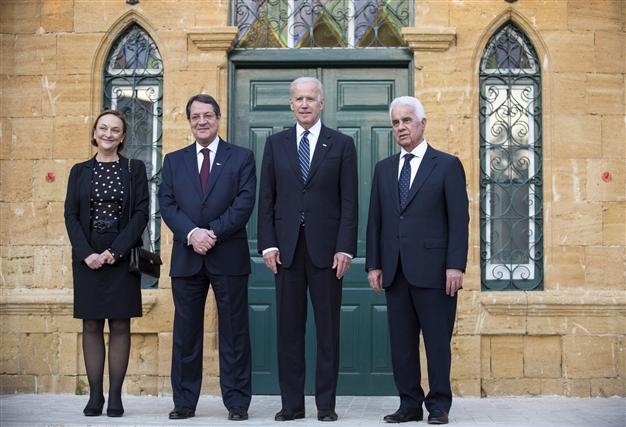
The Vice President of the United States of America, Joe Biden with the U.N Secretary -General’s Special Representative in Cyprus Lisa Buttenheim who brought the Turkish Cypriot Community leader Derviş Eroğlu and the Greek Cypriot Community leader Nicos Anastasiades together on the 22nd May 2014.
After signing this Joint Declaration the inter-communal talks are at present conducted by the Turkish Cypriot negotiator Mr. Kudret Ozersay and by the Greek Cypriot negotiator Mr. Andreas Mavroyannis. Whilst the Turkish side are putting every effort and concentration on reaching a quick and final agreement and taking it to a referendum of both communities, the Greek Cypriot side focused their emphasis and concentration on the Confidence Building Measures and within that to get the Varosha (Kapalı Maraş) returned to them.
The Turkish side considers the fenced part of Varosha issue (Maraş) as being the main part of the Negotiations and settling the issue of Varosha (Maraş) beforehand means; it will cause the stimulation and momentum of the negotiations to be lost and will prolong the final settlement or to make it impossible.
Whilst the two communities continue to give a different meaning and interpretation to the clauses of the Joint Declaration, the United States raised their concentration in solving the Cyprus problem to the highest level and with that emphases the Vice President of the United States of America, Joe Biden visited the island in May and brought the two leader of the Communities Derviş Eroğlu and Nicos Anastasiades together on the 22nd May 2014.
Despite all the efforts put in by the United State of America, European Union, United Nations and leading Countries including the Guarantor Countries of Cyprus, United Kingdom and especially Turkey, the two communities are still far from reaching a lasting settlement.
Everyone is emphasising that coming to a settlement will help the economies of both communities, will bring peace and prosperity to the island; open the way for bringing out the rich gas reserves and exporting these to the European Countries by the cheaper way via Turkey; bring stability to the area of Eastern Mediterranean.
However, whilst the Turkish side agrees on the previously resolved issues and accepts to continue the negotiations on the unresolved matters, the Greek Cypriots do not accept the issues agreed on and resolved during the Negotiations held between the TRNC 2nd President Mehmetali Talat, the present TRNC President Derviş Eroğlu and the Greek Cypriot leader Demetris Christophias and contrary to the 2nd clause of the Joint Declaration “All unresolved core issues will be on the table”, and will be discussed interdependently”, —- (that means the already agreed core issues will not be open for discussion again) insist that all issues, including previously resolved ones, will be open for negotiations in order to reach a settlement.
Under the circumstances the Greek Cypriot leader is blatantly in violation of his signature and the Joint Declaration. Therefore, God Knows how long it will take these negotiations again to complete and will we ever be able to see the end of it ?…
I sincerely hope to see the successful completion of these negotiations.
The realty is for the last 45 years, one set of negotiations ends and a new set of negotiations begins or stops or starts with different cummunity leaders with different plans and agenda but all their aims is to solve the Cyprus problem. At the present time, the political situation is as follows; Whilst the TRNC president Dervis Eroglu on the 7th July 2014 put a 5-Step Road Map on the future of the negotiations to the Greek Cypriots, to reach a settlement and put the final agreement to referandum for both communities.
The Greek Cypriots past strategy was ‘‘saying that the Cyprus Problem is the Problem of the two communities and should be solved between themselves’’ but after the Greek Cypriot’s leader Nicos Anastasiades recent visit to Greece with the Greek Prime Minister Andonis Samaras has abandoned their existing plan stated above and altered their strategy on Cyprus claiming the Cyprus Problem is now a problem for the European Union and the E.U to apply pressure on Turkey to solve it, obviously to suit their own demands.
If this should not happen, then the European Union would continue to keep frozen the 8 accession talks of Turkey which was imposed by the E.U on 11 December 2006. The European Commission had pledged on the 26th April 2004, after the Turkish Cypriot on the 24th April 2004 referandum accepted the United Nation’s Peace Plan (Annan plan) that the E.U would lift the Isolation / Embargo on the Turkish Cypriots.
This did not happen, therefore Turkey refused to recognize the Republic of Cyprus as a E.U member, and would not allow the Greek Cypriots Ships and/or Aircraft to use Turkey’s ports and/or airspace until the European Union honored their comitment to lift the isolation / embargos on the Turkish Cypriots.
After the Greek Cypriots became a member of the E.U, they used their membership rights to also block 6 Subject of Turkish accession talks with the E.U until Turkey recognize the Cyprus Republic and normalize her relationship with them i.e to allow the Greek Cypriots ships and aircrafts to use the Turkish Ports and Air Space.
As a matter of fact the Greek Cypriots and the European Union are continueing to ignore the legal restrictions which is that, Cyprus Republic should not have joined or the European Union, without the Turkish Cypriots should not have accepted the Greek Cypriots alone to join the E.U. This is illigal and against the Cyprus Constitution, Appendix B: Treaty of Guarantee, as per the clause which is written on the pages 15 and 16 of this book.
Whilst coming to the end of this article, I would like to be positive and to say that I wish and hope the Cyprus Problem could also come to an end with a fair settlement towards the end of this year or in the middle of next year. The observation is that, after the opening of the border between the North and the South of the Island and the opening entry gates for the passage by peoples to both sides since 2003, there has been no major bad incident between the two communities.
Peoples from either side can come and go feely for shopping and visits everywhere. In recent months, the heads of the religions on both side came together to contribute for the peace on the island. People from the South of the island are holding religious celebrations at the historical Churches in the North.
Turkish Cypriots passed to the South by 21 buses and visited Hala Sultan Tekkesi (Tomb of Umm Hiram) on the 28th July at Ramazan Bayramı (Eid prayer). In addition to the social improvements, the rich gas reserves found in the past years at the alleged E.E.Z in the Eastern Mediterranean Sea of the Island, if can be brought out and exported to Europe via the cheapest way by Turkey, this could help to the troubled economy of the South and also to help for the economic improvement of the North, bringing prosperity to the island as a whole.
With these positive elements above, if the leaders of the political parties and representatives of the civil societies on both side of the Island stopped their negative propaganda and start presenting to public the benefits of coming to a settlement, as demonstrated by the Turkish and Greek Cypriots Building Contractors Union/Association and two sides including Turkey’s and Greece Chamber of Commerce, after coming together on the 23rd May and 2nd June, which announced their signed protocol for their future cooperation and to give their support for the negotiations, the political leaders of both side and the negotiators will find themselves in more relaxed atmosphere to make decisions in the direction of reaching to a fair settlement.
I can say that this responsibility lies much more on the shoulders of the Greek Cypriots political leaders and representatives of the civil societies. According to the statistics, the Turkish Cypriot people are more ready and willing to accept a fair settlement than the Greek Cypriots. The Turkish Cypriots in their heart and mind accept that this island belongs to the two communities and off course other minorities.
The problem is with the Greek Cypriots to accept that this island does not belong to them alone and they must accept that the Turkish Cypriot is no less than the equal owners of this island. If a settlement can be reached, it should be in accordance with the Security Council Resolution 649 dated 12,March 1990, and the Joint Declaration signed on the 11th February 2014 as per states on Section 3; ‘‘The settlement will be based on a bi-communal, bi-zonal federation with political equality, as set out in the relevant Security Council Resolutions and the High Level Agreements’’ and the Federal Government will comprise by two constituent states as outlined on section 4 of the Joint Declaration as states; ‘‘The united Cyprus federation shall result from the settlement following the settlement’s approval by separate simultaneous referenda.
“The Federal constitution shall prescribe that the United Cyprus federation shall be composed of two constituent states of equal status’’
SO THE BIG QUESTION STILL REMAINS.
Will the Turkish and Greek Cypriots reach a settlement in Cyprus embracing the principle described above or should both sides just walk their own paths to their own destiny???
Well, we will wait and see.
It looks however that, either reaching a settlement or the negotiations at least the present one coming to an end is not far away.
